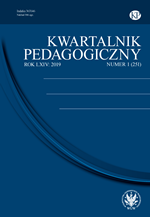Międzynarodowe testy języka angielskiego: japońskie paradoksy i kontrowersje
International tests of English: Japanese paradoxes and controversies
Author(s): Agnieszka Gromkowska-MelosikSubject(s): Social Sciences, Education, Culture and social structure
Published by: Wydawnictwa Uniwersytetu Warszawskiego
Keywords: tests, English; competencies; identity
Summary/Abstract: The aim of the article is to describe – on the example of teaching English – the reductionistic character of the testing phenomenon. Global international tests (TOEFL and TOEIC) provide excellent arguments to critics of the phenomenon of “testology”, related to reducing the school’s identity and student identity to results of test. An excellent example of this phenomenon is Japanese society. In Japan, where English is considered the cultural and professional capital of individuals, the paradoxes (and absurdities) of testing find their best exemplification. At the same time, the fact that English is completely different from Japanese results in contextualizing language tests in different, sometimes unexpected, cultural aspects of life. In addition, the controversy surrounding the testing of the English language proficiency in Japan is related to the discussion about cultural imperialism. All these issues will be analysed in the article, not only in the Japanese context but also in relation to whole “testing culture”.
Journal: Kwartalnik Pedagogiczny
- Issue Year: 251/2019
- Issue No: 1
- Page Range: 47-57
- Page Count: 11
- Language: Polish
- Content File-PDF

